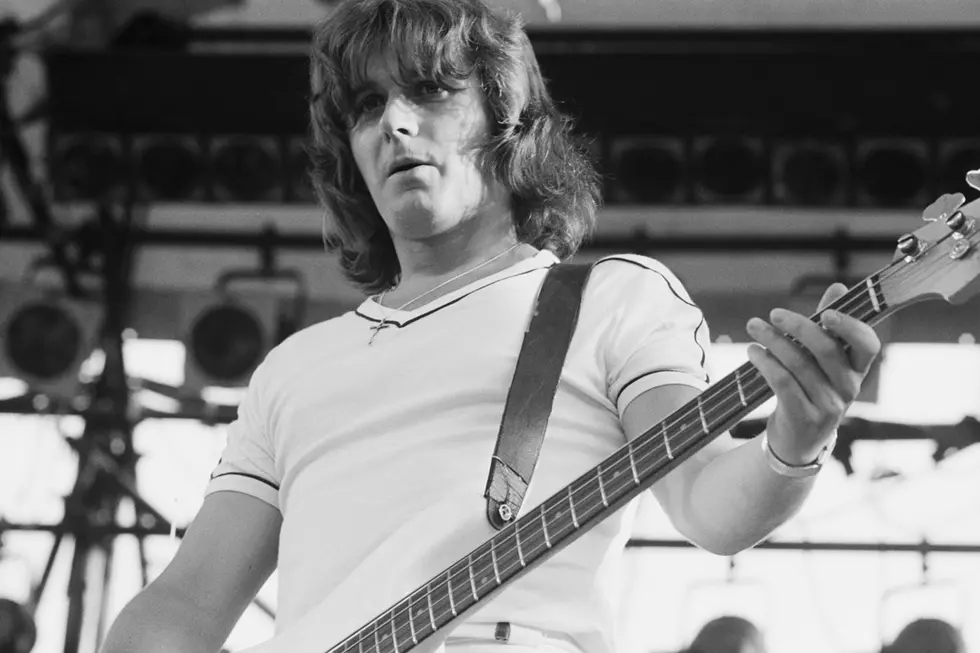
Top 10 John Wetton Songs
Best known for fronting Asia, the late singer-songwriter and bassist John Wetton also had notable stints in bands like King Crimson and U.K. Our list of the Top 10 John Wetton Songs explores solo and side projects that directly fed into his better-known group work, as well.
Asia – where Wetton made his most memorable contributions from 1981-83 and then again from 2006-17 with Geoff Downes, Carl Palmer and Steve Howe – will always stand as a career cornerstone. But there's much more to his legacy – and that's leaving aside short-lived tenures in Uriah Heep (with whom he memorably recorded the propulsive "One Way or Another" in 1976) and Wishbone Ash (where he wrote and sang 1981's "That's That").
Here are our Top 10 John Wetton songs.
10. "I Know How You Feel"
From: Asia's XXX (2012)
A layered, emotionally raw track from Asia's final original-lineup album, this is more than just a high-water mark of the band's second era. Wetton and Geoff Downes combine for one of the most propulsive moments on XXX, as an insistent keyboard girds what stands as the album's most committed vocal. What's more, "I Know How You Feel" became one of the best arguments for Asia’s reforming after so long away, just before guitarist Steve Howe left again after a three-album run beginning in 2008. That was the longest the original lineup ever stayed together.
9. "Exiles"
From: King Crimson's Larks Tongues in Aspic (1973)
Wetton helped lead King Crimson away from their influential early prog sound into more free-form areas, as band leader Robert Fripp added David Cross, Jamie Muir and former Yes co-founder Bill Bruford to form the group's short-lived fifth incarnation. The intro to "Exiles" is actually adapted from a piece of music that dates back to shows played by the original 1969 Crimson lineup, but almost nothing about the rest of this song – a great example of this lineup's ability to move from one eruptive musical texture to another, and then to another still – could possibly be confused with any other era. Over the next two albums, Muir and Cross departed.
8. "Raised in Captivity"
From: Raised in Captivity, solo (2011)
Wetton's final solo release was highlighted by this long-awaited reunion with former King Crimson bandmate Robert Fripp. Produced and co-written by Billy Sherwood, "Raised in Captivity" begins on an appropriately spacey note, as the track floats weightlessly into a crunchy bass line by Wetton. Fripp then adds a series of brilliant blurts while Wetton and Sherwood settle into a more conventional arc — neatly approximating Asia's old pop-prog style. That is until Fripp returns, playing a solo of unpredictable momentum that sounds, by turns, like a nervy shiver then a panicky sneer – and then like stray-cat music. As Wetton repeats the soaring chorus, “Raised in Captivity” is finally subsumed by wave after dreamy wave of tape-looping Frippertronics.
7. "Only Time Will Tell"
From: Asia (1982)
Asia's second Top 20 hit, following their No. 4 debut "Heat of the Moment," continued an emotional theme for Wetton, who was emerging from a busted romance. Later, his music would take a far more upbeat tack, even as he overcame personal struggles that led to his first departure from Asia. (Check out 2009's "Peace in Our Time," a determinedly hopeful song from his Icon side project with Geoff Downes that also featured Hugh McDowell of Electric Light Orchestra.) In the meantime, the initial singles from Asia were tailor-made for those in search of post-relationship catharsis. "The first song ['Heat of the Moment'] is an apology," Wetton said years later. "The second song ['Only Time Will Tell'] is, 'You bitch, how dare you!' and the third one ['Soul Survivor'] is 'I’m going to get over this.'"
6. "Nothing to Lose"
From: U.K.'s Danger Money (1979)
Asia didn't come out of nowhere. Wetton was trying out a similar brand of pop-prog years before while still a member of the unjustly overlooked supergroup U.K. with Eddie Jobson and Terry Bozzio. The only difference was nobody paid much attention: Danger Money stalled outside the Top 40. Ultimately, U.K. broke up after just two albums because Wetton and Jobson – who mixed and matched short and expanded pieces here – apparently couldn't agree on how long the songs should run. Wetton eventually found a new musical partnership with Geoff Downes, and everything fell into place for run up the pop charts. U.K.'s last song was the 12-plus minute behemoth "Carrying No Cross."
5. "My Own Time (I'll Do What I Want)"
From: Asia's Alpha (1983)
“My Own Time” wasn’t the big hit from Asia’s sophomore effort Alpha; that was the Top 10 “Don’t Cry,” with its Indiana Jones-styled video. Still, this memorable deep cut — with its tough-guy subtitle “I’ll Do What I Want” — strikes the deeper chord, in particular with anyone who has suffered through romantic entanglements. Like all but one track on the album, “My Own Time” was written by Wetton and Geoff Downes, who seemed to be in ascension as principal collaborators. Alpha eventually went platinum, but that was seen as a disappointment after Asia’s four million-selling self-titled debut. Wetton wouldn't last much longer.
4. "The Night Watch"
From: King Crimson's Starless and Bible Black (1974)
Recorded during a period of intense touring, Starless and Bible Black blends studio recordings and live songs – something used to intriguing effect on "The Night Watch." The track's initial section, recorded during an appearance at the Concertgebouw in Amsterdam, was deemed worthy of inclusion – but Robert Fripp's Mellotron had broken down onstage after that. He decided to use the opening attempt, then stitch in a new studio recording featuring Wetton's vocal to complete things. As had become the norm, lyrics were written by Wetton's friend Richard Palmer-James, a former Supertramp guitarist who delves into the imagined world of a Rembrandt painting of the same name.
3. "Walking on Air"
From: Battle Lines, solo (1994)
Originally issued in Japan as Voice Mail, this project found Wetton beginning again as a solo artist after an on-again, off-again period with Asia. He arrived with a cache of 45 songs, including this stand-out cut. Over the course of the sessions, however, Wetton found that he couldn't adequately reproduce the ghostly sound of the $50 keyboard he'd originally used on the demo. He ultimately decided to rebuild the song around his first try. "Walking on Air" then led him back to Asia in a way. Wetton later tried it out as an amped-up collaboration with his old bandmate Geoff Downes, including it as part of 2002's pre-reunion Wetton/Downes.
2. "Here Comes the Feeling"
From: Asia (1982)
That feeling? Dread. Co-written by Wetton and Steve Howe, the rousing “Here Comes the Feeling” closed out Asia’s blockbuster self-titled debut. It remains one of the songs that lived up to the episodic inventiveness of the supergroup’s previous bands — associations that gave Asia early cache. But between their shared history in the creation of progressive rock as former members of Emerson, Lake and Palmer, Yes and U.K., an early pair of radio-friendly hits and a nine-week run at the top of the Billboard album charts for Asia, the band became an instant pressure cooker. Things would never be the same after this album.
1. "Starless"
From: King Crimson's Red (1974)
The trio of Wetton, Robert Fripp and Bill Bruford recorded the underrated Red album with help from former King Crimson members David Cross, Ian McDonald and Mel Collins. Originally conceived by Wetton as the title track to Crimson’s previous recording, the song had been left out and reworked over the late spring tour of 1974 — eventually reemerging not as a straight-forward ballad, but as one of their more typically expanded musical explorations. That long gestation period led to some interesting twists in the song’s evolution: For instance, Bruford, the drummer, suggested the bass riff that dominates the lengthy instrumental section — and the title had to be shortened, since the album Starless and the Black Bible had already come out.
More From Ultimate Classic Rock









